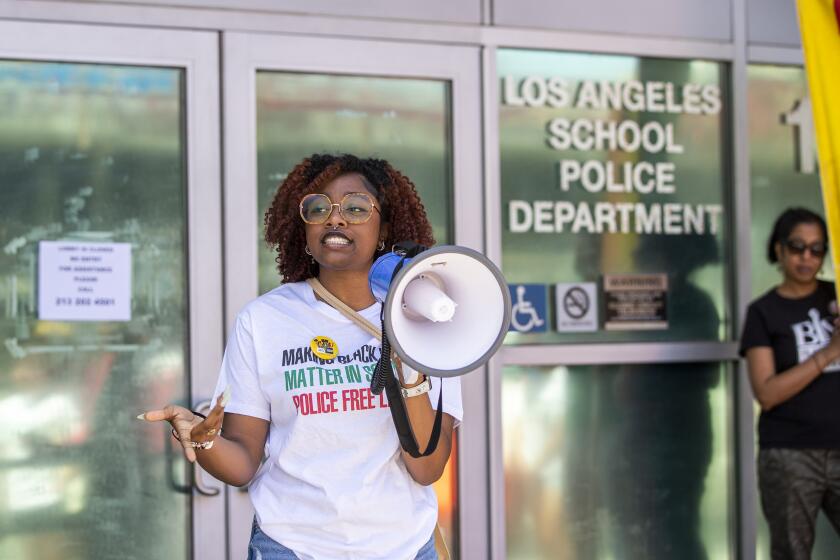Profound challenges face LAUSD candidates, but big donors still fight over charter schools
- Share via
Two candidates vying for a Los Angeles school board seat that has been held for 16 years by termed-out Monica Garcia offer distinct views on how high-poverty schools should be funded and how the board should find the right balance of regulation for charters.
The runoff between Rocio Rivas, a senior aide to school board member Jackie Goldberg, and Maria Brenes, the longtime director of the local group InnerCity Struggle, has drawn in two unions and a pair of businessmen who have hurled about $7.8 million into the race to represent a district that includes downtown and Boyle Heights.
In another race, in the east San Fernando Valley, school board President Kelly Gonez is thrust into a runoff against high school Spanish teacher Marvin Rodriguez. Gonez has a huge advantage in campaign resources.
All four candidates pledge to address a dizzying array of challenges — declining enrollment, teen drug abuse, school security concerns, pandemic setbacks and wide achievement gaps affecting Black and Latino students — and have strikingly similar views on many issues.
But it’s largely their stance on the years-old debate over charter schools — plus the extent of backing they have received from unions — that is fueling the dollars pouring into both races ahead of the Nov. 8 election.
District 2
Rocio Rivas, a senior aide to school board member Jackie Goldberg, and Maria Brenes, director of the advocacy and family-services group InnerCity Struggle, are battling to replace Monica Garcia.
District 2 includes downtown and surrounding neighborhoods, especially to the east.
Rivas, 49, is the chosen candidate of the United Teachers Los Angeles union. Brenes, 46, has benefited from an independent campaign funded by major supporters of charter schools. These donors launched a negative campaign against Rivas, calling her a “bureaucrat” and claiming, without evidence, that she wants to close schools and lay off teachers.
One distinction between the candidates could affect the resources available to every school in the nation’s second-largest system.
Brenes has long been part of a coalition pushing for a massive redistribution of district funding. The members want increasing support for schools they’ve identified as serving the students most in need. The coalition, which includes Catalyst California, Community Coalition and Partnership for Los Angeles Schools, has had some success but wants the redistribution accelerated.
“Budgets reflect values,” Brenes said. The formula that activists developed to guide the redistribution “has been very important” in beginning to reverse past inequities, she said. “We have to figure out how do we institutionalize those dollars for the long term in those investments.”
While the teachers union has generally endorsed targeted spending, its leaders also have strongly supported a base level of funding for every school so that each has the resources for class-size reduction, a librarian and a nurse.
Rivas declined to be interviewed. However, she spoke at length earlier this year about how she sees both principles as vital: She would like the advocates to win the priority spending needed by struggling schools without sacrificing programs at other schools.
Rivas looks to increased state funding as the solution.
Supt. Carvalho signals that he’ll support school police in response to parents’ concerns. Student activists demand defunding.
But the coalition of which Brenes is a part has made it clear that it is unwilling to wait for money for all. Schools with better-off families, it has said, can raise their own funds if needed. The priority has to be doing whatever it takes to remedy generational poverty and extremely low academic achievement.
This distinction hasn’t mattered recently, because schools have been flooded with funding from one-time COVID-19 relief payments and record state tax revenue. However, it’s unclear what will happen when a recession hits or budgets have to be cut for other reasons.
Brenes’ election could pressure L.A. schools Supt. Alberto Carvalho to shift more spending to the schools with the highest need — and away from others.
Similarly, the election of Rivas could pressure Carvalho to accept teachers union proposals as bargaining continues over a new contract. The union wants a 20% raise over two years.
Another union has entered the fray with a big spending play. Local 99 of Service Employees International Union — whose members include custodians, food service workers, teacher aides and bus drivers — also has a negotiating agenda and is supporting Brenes.
In the June primary, Rivas finished with 44% of the vote and Brenes had 30% in a field of four.
With the exception of Local 99, the campaign spending substantially reflects the divide between the teachers union and supporters of charters, which are privately operated public schools and mostly nonunion. About 1 in 5 district students attends a charter.
Like the teachers union that backs her, Rivas sees charters as part of an organized effort to weaken and diminish the value of traditional public education and push education into the private and for-profit domain.
“Seeing the charter-school industry and privatization and how they’re really going after our public schools and changing what public education is ... that is what’s really driving me,” Rivas said. “Because I was seeing the greed in privatization. I see what these billionaires want to do to our schools, and I’m standing firmly against that.”
Rivas opposes having charters share space on campuses with district-run schools — though under state law, there may be little she can do about it.
Brenes also opposes opening new charters in District 2, citing declining enrollment, but said parents at all types of public schools “want a voice — they want to be heard, their ideas taken into account.”
Through Oct. 22, Brenes had raised $610,168 while Rivas had has raised $115,153. Charter supporters figure prominently among those who have backed Brenes, although she has a broad base of support, including from unions other than UTLA.
Through October, independent spending on behalf of Brenes reached about $4.9 million. It comes primarily from two sources: Local 99 and a political action committee funded by Netflix founder Reed Hastings, who is a charter school supporter, and retired businessman Bill Bloomfield.
Through October, the teachers union had spent more than $2.5 million on behalf of Rivas.
2022 California test scores show 84% of Black students and 79% of Latino and low-income students did not meet state math standards.
About $422,000 has been spent in the negative campaign against Rivas by Hastings and Bloomfield.
Before announcing her bid for office, Brenes served on the city redistricting committee as an appointee of the mayor. The process has come under scrutiny in the wake of a leaked recording containing racist remarks by then-Los Angeles City Council President Nury Martinez, Councilmembers Kevin de León and Gil Cedillo and L.A. County Federation of Labor President Ron Herrera. Martinez and Herrera have since resigned.
Brenes has joined other school board candidates in calling for the resignation of all involved.
Brenes’ husband, Luis Sanchez, chaired the committee that oversaw the redrawing of school district boundaries. Her residence was not affected by the updated maps.
District 6
In District 6, Marvin Rodriguez is trying to unseat Kelly Gonez, who was first elected as school board president in 2017.
Rodriguez, 43, said he would bring to the board the benefit of 17 years of teaching experience and talks of the joy of driving with his daughter to school every day. A Marine Corps combat veteran, he also trains students to run the L.A. Marathon. He said he would connect better with the community than Gonez does.
“The reality is that our communities don’t need saving,” he said. “Our communities need leaders who want to talk to us, experience the hardships, experience our struggles and together say, ‘Hey, we got it. We’re gonna get through this together.’”
Rodriguez also said Gonez should carry out her job with more transparency and accessibility.
Gonez, 34, whose oldest child is just starting school, cites her broad experience in government, including on the school board and in the U.S. Department of Education during the Obama administration. She also taught middle school for several years.
As successes, she cited more students in Advanced Placement courses and dual-language programs and the overall pandemic response — including providing computers, internet and a meal program and insisting on strict health protocols that kept Los Angeles campuses closed until spring 2021.
“The district stepped up in a historic way,” Gonez said, notable for “the robustness of our response and the compassion of our response.”
Gonez was instrumental in the hiring of Carvalho, the longtime leader of the Miami-Dade school system.
Both Gonez and Rodriguez stressed the urgency of focusing on learning recovery.
Gonez has collected all the major endorsements, including that of the teachers union. With $500,000 raised, she has a fundraising advantage of 47 to 1. In addition, Local 99 and the PAC of Hastings and Bloomfield have combined to spend close to $400,000 on her behalf.
Rodriguez has raised $10,635.
In the June primary, Gonez had 48% of the vote, and Rodriguez had 31% in a field of three.
More to Read
Sign up for Essential California
The most important California stories and recommendations in your inbox every morning.
You may occasionally receive promotional content from the Los Angeles Times.
















